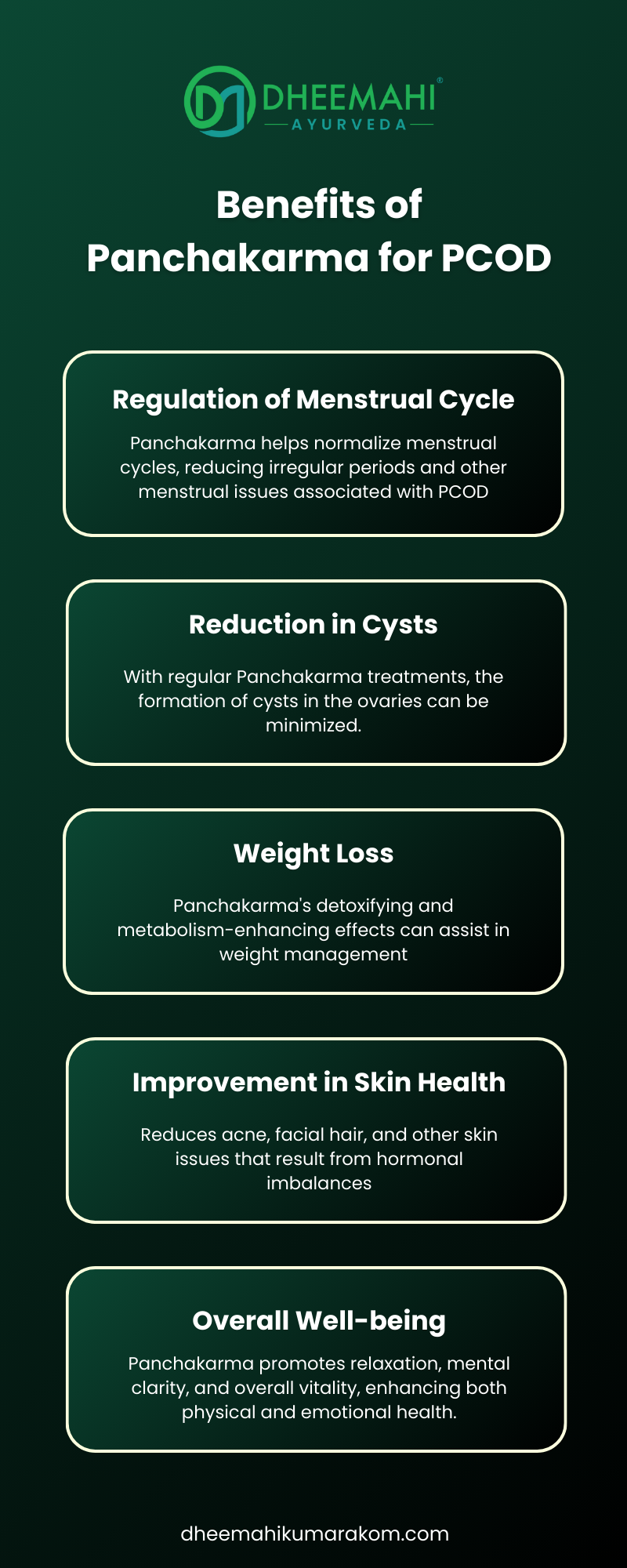Can PCOD be cured through Panchakarma treatment?
Dr. Athul P
Polycystic Ovarian Disease (PCOD) is a common hormonal disorder affecting women of reproductive age, characterized by the production of multiple eggs in the ovaries, which eventually develop into cysts.
Many women with PCOD are prescribed hormonal medications, which often lead to unwanted side effects. Additionally, excessive insulin and high levels of luteinizing hormone can stimulate the ovaries to produce elevated amounts of testosterone, a male hormone.
This hormonal imbalance can reduce fertility, making it more difficult for women to conceive. Adopting a healthy lifestyle, embracing natural therapies, and turning to Ayurveda can be crucial in managing and preventing PCOD.
What is PCOD?
Polycystic Ovary Disorder (PCOD) is a condition in which a woman’s ovaries produce an excess of male hormones (androgens), leading to the development of multiple small cysts in the ovaries. The exact cause of PCOD is unknown, but it is often linked to insulin resistance, obesity, and genetics. Common symptoms of PCOD include:
- Irregular or absent menstrual cycles
- Difficulty getting pregnant
- Excessive facial and body hair (hirsutism)
- Acne and oily skin
- Thinning hair on the scalp
- Weight gain or obesity
PCOD is a chronic condition that may require long-term management to prevent complications such as infertility, diabetes, and cardiovascular diseases.
How Ayurveda Views PCOD
Ayurveda, the ancient Indian system of medicine, views PCOD as a result of imbalanced doshas (body energies)—primarily Vata and Kapha doshas.
These imbalances can manifest as excess heat, toxins, and sluggish circulation in the body, disrupting the menstrual cycle and leading to cyst formation in the ovaries. Ayurveda focuses on restoring harmony between the doshas, cleansing the body of accumulated toxins, and improving the function of the reproductive system.
Treatments such as herbal formulations, dietary adjustments, and Panchakarma help to correct these imbalances, restore natural cycles, and promote overall well-being.
What is Panchakarma Treatment?
Panchakarma is a specialized therapeutic process in Ayurveda designed to detoxify the body and restore its natural balance. The term “Panchakarma” translates to “five actions” and involves a series of treatments aimed at removing accumulated toxins (ama) and balancing the three doshas: Vata, Pitta, and Kapha.
The five main components of Panchakarma include:
Vamana (Emesis therapy): Induced vomiting to expel excess Kapha from the body.
Virechana (Purgation therapy): Cleansing of the bowels to eliminate excess Pitta and associated toxins.
Basti (Enema therapy): Detoxification through medicated enemas, especially to balance the Vata dosha.
Matra Vasti: A gentle form of enema therapy using medicated oils, aimed at nourishing and lubricating the body. It is typically used to treat Vata imbalances and promote overall well-being.
Kashayavasti: A stronger form of enema therapy using herbal decoctions, primarily used to cleanse and balance the doshas, especially Vata and Pitta.
Nasya (Nasal therapy): Administration of herbal oils through the nostrils to cleanse the sinuses and head, helping to clear toxins from the upper respiratory system.
Panchakarma aims to balance the doshas, cleanse the body, and restore health. When tailored to an individual’s needs, this holistic treatment can have profound effects on conditions like PCOD by removing accumulated toxins, balancing hormones, and promoting overall well-being.
How Panchakarma Helps with PCOD
Panchakarma is a traditional Ayurvedic therapy focused on detoxifying and balancing the body’s energies (doshas). It involves a series of therapeutic treatments designed to remove toxins, promote healing, and restore harmony in the body.
Panchakarma may assist in managing PCOD by addressing some of its underlying causes and alleviating associated symptoms. Here’s how Panchakarma treatment can support PCOD management:
1. Detoxification
Panchakarma includes various cleansing procedures that aim to eliminate accumulated toxins (ama) from the body. PCOD is often linked to hormonal imbalances and metabolic disturbances, and detoxification can help improve metabolic processes, support hormonal balance, and promote overall well-being.
2. Hormone Regulation
Ayurvedic herbs and therapies used in Panchakarma, such as Shatavari and Ashwagandha, are known for their ability to regulate hormones. Since hormonal imbalance plays a key role in PCOD, these treatments can help restore hormonal equilibrium and improve menstrual regularity.
3. Stress Reduction
Stress is a key factor in aggravating PCOD symptoms. Panchakarma offers effective external treatments to reduce stress and promote relaxation. Abhyanga (a full-body oil massage) with warm herbal oils helps to release tension, calm the nervous system, and improve circulation. Shirodhara, the gentle pouring of warm herbal oil over the forehead, induces deep relaxation, calms the mind, and reduces anxiety. These treatments help manage stress, supporting overall well-being and alleviating PCOD symptoms.
4. Diet and Lifestyle Guidance
Ayurvedic practitioners provide personalized dietary and lifestyle recommendations to support overall health and balance the doshas. These changes help individuals with PCOD adopt healthier habits, which can lead to improved symptom management and better long-term health.
5. Weight Management
Many women with PCOD face challenges with weight management due to hormonal imbalances and metabolic issues. Panchakarma treatments may include specific dietary modifications and therapies aimed at supporting healthy weight loss, which is crucial for managing PCOD and improving fertility.
6. Improved Digestion
Panchakarma enhances digestive function, which is vital for nutrient absorption and overall health. Better digestion supports the body’s ability to process food efficiently, contributing to the management of PCOD symptoms and promoting overall vitality.
By addressing these key factors, Panchakarma offers a holistic approach to managing PCOD, promoting hormonal balance, stress reduction, and improved overall health.

Benefits of Panchakarma for PCOD
Regulation of Menstrual Cycle: Panchakarma helps normalize menstrual cycles, reducing irregular periods and other menstrual issues associated with PCOD.
Reduction in Cysts: With regular Panchakarma treatments, the formation of cysts in the ovaries can be minimized.
Weight Loss: Panchakarma’s detoxifying and metabolism-enhancing effects can assist in weight management, which is crucial for women with PCOD.
Improvement in Skin Health: Reduces acne, facial hair, and other skin issues that result from hormonal imbalances.
Overall Well-being: Panchakarma promotes relaxation, mental clarity, and overall vitality, enhancing both physical and emotional health.
Is Panchakarma a Cure for PCOD?
While Panchakarma is a highly effective treatment for managing PCOD symptoms and improving overall reproductive health, it is important to understand that PCOD is a chronic condition, and there is currently no permanent cure for it.
However, Panchakarma can significantly reduce the severity of symptoms, improve hormonal balance, and promote long-term wellness. By addressing the root causes and balancing the doshas, Ayurveda offers a holistic approach that can greatly enhance the quality of life for women with PCOD.
Why Choose Dheemahi Ayurveda for PCOD Treatment?
Dheemahi Ayurveda is a trusted center specializing in holistic treatments for PCOD and other health conditions. Here’s why Dheemahi Ayurveda is a great choice for your PCOD treatment:
- Personalized Care: Every woman’s body is unique, and Dheemahi Ayurveda offers customized Panchakarma treatment plans tailored to your specific needs and health condition.
- Experienced Practitioners: The center is staffed by qualified Ayurvedic doctors and therapists with years of experience treating PCOD with Panchakarma and other Ayurvedic therapies.
- Comprehensive Approach: Dheemahi Ayurveda focuses on both internal and external healing. The treatments are designed to detoxify and rejuvenate and nourish the body for long-term benefits.
- Supportive Environment: Besides the physical treatments, Dheemahi Ayurveda offers guidance on diet, lifestyle, and mental well-being, ensuring a holistic approach to your PCOD management.
Conclusion
Panchakarma offers an effective and holistic approach to managing and reducing the symptoms of PCOD. While it may not provide a permanent cure, it can significantly improve hormonal balance, regulate the menstrual cycle, and promote overall reproductive health.
By addressing the root causes of the condition and restoring the body’s natural balance, Panchakarma offers relief for women with PCOD, helping them lead a healthier, more vibrant life. For personalized care and expert guidance, Dheemahi Ayurveda is an excellent choice for women seeking Ayurvedic treatment for PCOD.
How Our Booking Process Works
The unique approach involves a series of discussion during your initial decision-making process to make sure that we will be able to match your expectations with our treatment.
Based on the discussions with you our team of expert doctors will design the best treatment package personalized for your needs.
01
Consultation Form
Fill out our consultation form, and let us know when will you be available for our doctor to talk to you
02
Discussion with Doctor
Discuss your health condition and expectations with our doctor.
03
Booking Confirmation
Confirm the booking by making a payment of 50% advance.
Consultation Form
Submit this form to initiate a booking with us
Have any queries? We will help you. Talk to us now
Say Goodbye to Health Woes & Hello to Healthy Living
Dheemahi Ayurvedic Pvt Ltd
12/386 Varaputhara Road
Kumarakom, Kerala, India
Pin 686563
Dheemahi Ayurvedic Centre, Near Neelimangalam Bridge, Kumaranaloor, Perumbaikad.P.O, Kottayam, Kerala, India, Pin 686016
Other Treatments
Karkidaka Chikilsa | Ayurvedic Treatment for Depression | How to Reduce Stress Naturally | Autoimmune Disorders | Mental Health Ayurvedic Treatment | Weight-Loss Treatment | Frozen Shoulder Ayurvedic Treatment | Diabetes Ayurvedic Treatment | PCOS Ayurvedic Treatment | Celiac Disease Treatment | ayurvedic treatment for skin diseases | nervous system ayurvedic treatment | Back Pain Ayurvedic Treatment | Cervical Spondylitis Ayurvedic Treatment | ayurvedic treatment for blood sugar | Fatty Liver Ayurvedic Treatment | Knee Pain Ayurvedic Treatment | Migraine Ayurvedic Treatment | Osteoarthritis Ayurvedic Treatment | Psoriasis Ayurvedic Treatment | Sinusitis Ayurvedic Treatment | Ayurvedic Detox Treatment | Migraine Ayurvedic Treatment | Ayurvedic Treatment for Rheumatoid Arthritis | Ayurvedic treatment for joint pain | Ayurvedic treatment for ulcerative colitis | Panchakarma Treatment |

